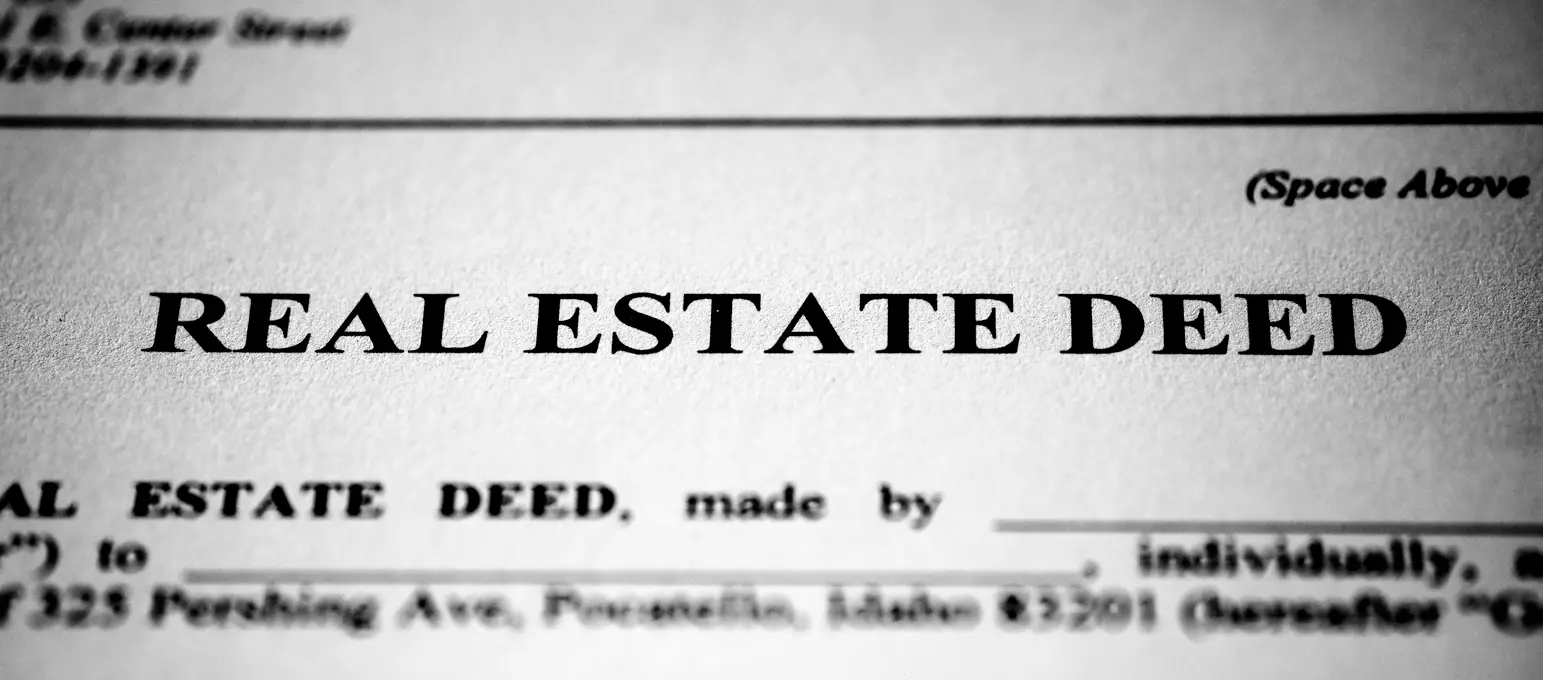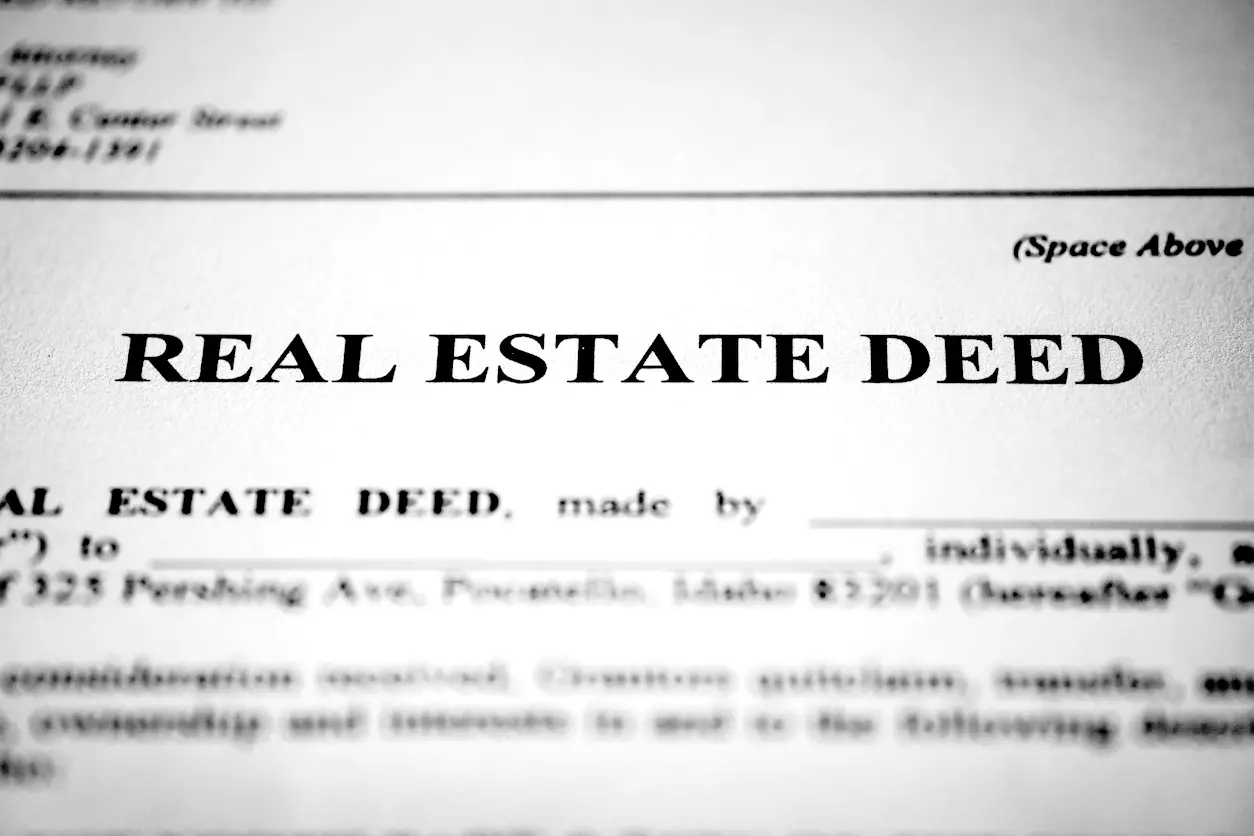What Is A Property Deed

Table of Contents
- What Is A Property Deed
- Property Deed vs. Title
- Types of Property Deeds
- Warranty Deed
- Quitclaim Deed
- Special Warranty Deed
- Grant Deed
- Bargain and Sale Deed
- Transfer-on-Death (TOD) Deed
- Sheriff's Deed
- Executor’s or Administrator’s Deed
- Tax Deed
- What’s Included in a Property Deed
- How Property Deeds Work in Real Estate Transactions
- Why Property Deeds Matter
A property deed is a formal document used in transferring the ownership of real estate property from the grantor or seller to the grantee or buyer. It serves as formal evidence that a person holds legal rights to a piece of property. Whether buying, selling, or inheriting real estate, a deed is an important part of the process.
The document must include important details such as the names of the grantor and grantee, a legal description of the property, and the date of transfer. For a property deed to be considered valid, it must be written and signed by the parties involved and recorded in public records, typically at a county recorder's office.
Property Deed vs. Title
While people often use the terms "deed" and "title" interchangeably, they do not have the same meaning. A property deed is a legal document stating that a grantee or buyer owns a property, while a title is not a document but may be considered the actual or legal right of ownership. A title determines the individual with the power to transfer, use, and determine how the property is owned.
Simply, a title is the property right, and the deed conveys the right. Using a car purchase scenario, you may think of the title as your right to own the car, while the deed is like the receipt proving that the ownership of the car has been transferred to you. Hence, while the title is the ownership itself, the deed is the written proof in the eyes of the law of the transfer of ownership to you.
Types of Property Deeds
There are different types of property deeds serving unique purposes and providing varying levels of protection to grantees. Examples include the following:
Warranty Deed
A warranty deed offers the highest level of protection to the buyer. It guarantees that the seller or grantor holds a clear title to the property and has the legal right to transfer it. In a warranty deed, the seller makes a set of legally-binding promises, also called covenants, agreeing to protect the buyer from any demands or claims of any parties per the property. Pursuant to these covenants, the grantor must defend the title against any claims that may arise after the transfer of ownership. Such claims may even arise from a period before the grantor held the title to the property.
Quitclaim Deed
A quitclaim deed transfers any interest the seller or grantor may have in the property, without warranties or guarantees. It provides no protection to the buyer against defects in the title. This type of deed is commonly used between family members, divorcing spouses, or to clear up title issues. Quitclaim deeds are also commonly used in situations where a property has multiple owners or when one owner wishes to transfer their ownership interest as a gift to another party.
Special Warranty Deed
A special warranty deed offers limited protection. It guarantees that the seller has not caused any title problems during their ownership, but makes no promises about previous owners. It is often used in commercial real estate transactions.
Grant Deed
A grant deed provides some assurances to the buyer. It promises that the property has not already been transferred to someone else and that it is free from undisclosed liens. However, it does not cover title defects prior to the seller’s ownership.
Bargain and Sale Deed
A bargain and sale deed indicates that the seller owns the property being sold or transferred and possesses the right to transfer or sell the property, but it offers no warranties against liens or other liabilities. A bargain and sale deed is a common use in tax sales, foreclosures, or transfers by executors and trustees.
Transfer-on-Death (TOD) Deed
A transfer-on-death deed allows a property owner to name a beneficiary who will receive the property upon the owner’s death, without the need for probate. This deed may usually be changed or revoked at any time during the owner’s life.
Sheriff's Deed
This deed is required when a property is sold off at a sheriff’s sale, often due to foreclosure or court judgment. It transfers ownership from the debtor to the highest bidder. This deed generally provides limited or no warranties, meaning the buyer accepts the property “as-is,” potentially with liens or title issues.
Executor’s or Administrator’s Deed
An executor’s or administrator’s deed is used to transfer property from a deceased person’s estate. An executor issues it when there is a will; an administrator does so when there is not. The deed conveys property to heirs or buyers according to probate court approval. It may offer limited warranties, depending on state law and the estate’s circumstances.
Tax Deed
A tax deed is issued when a property is sold due to unpaid property taxes. After proper notice and a tax sale, the government transfers ownership to the buyer. Tax deeds typically come with no warranties and may require a quiet title action to clear liens.
What’s Included in a Property Deed
For a property deed to be legally valid and enforceable, it must include the following information:
- Names of the Grantor and Grantee: The full legal names of the grantor (the individual transferring the property) and the grantee (the individual receiving the property) must be clearly stated on a property deed.
- Legal Description of the Property: This is a precise description that sufficiently identifies the property being transferred. It should include details like lot number, boundaries, and specific features.
- Signature of the Grantor: The person transferring the property must sign the deed to validate the transfer. In some cases, the grantee’s signature may also be required, depending on local laws or the type of deed.
- Notarization: Typically, a property deed is required to be signed in the presence of a notary public, who verifies the identity of the parties and ensures the document is signed willingly and knowingly.
- Date of Transfer: The date when the deed is signed or the property is officially transferred is typically included in a deed.
- Recording Stamp: Once the deed is filed with the appropriate county office, it may receive a recording stamp, indicating that it has been officially entered into public records.
How Property Deeds Work in Real Estate Transactions
A property deed plays an important role in closing a real estate transaction as it allows the seller to legally transfer ownership to the buyer. During the closing stage of a real estate transaction, a property deed is prepared, including all necessary legal details, such as the names of the parties involved in the transaction and a description of the property to be transferred.

Once all terms have been agreed, the deed is signed by the seller, typically in the presence of a notary public. However, in some instances, the buyer may also be required to sign the deed. Upon the notarization of the document, it is submitted to the office of the local county recorder, where it becomes part of the public record in that jurisdiction. Once recorded, the buyer may now be recognized as the legal owner of the property.
Why Property Deeds Matter
A property deed is an important legal document as it serves the purpose of formal proof of ownership. When an individual holds a property deed recorded with the local county recorder, it may be used to confirm their legal right to the property.
Another important reason why a property deed is useful is that it is important in resolving disputes or addressing title claims. In situations where questions arise regarding the identity of the owner of a property, a legal deed will provide evidence to support an owner's claim. A property deed is also useful when selling, gifting, or transferring property to another party, as it makes the transfer official and valid in the eyes of the law.
Furthermore, deeds may be used for tracing the history of a party, allowing for an assessment of the chain of ownership. This can help a potential grantee determine potential issues on the property, such as liens, boundary problems, or other issues that arise in the future.
Search Property & Deed Records
Table of Contents
- What Is A Property Deed
- Property Deed vs. Title
- Types of Property Deeds
- Warranty Deed
- Quitclaim Deed
- Special Warranty Deed
- Grant Deed
- Bargain and Sale Deed
- Transfer-on-Death (TOD) Deed
- Sheriff's Deed
- Executor’s or Administrator’s Deed
- Tax Deed
- What’s Included in a Property Deed
- How Property Deeds Work in Real Estate Transactions
- Why Property Deeds Matter










